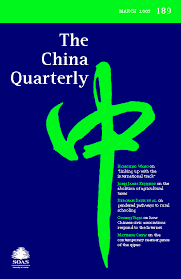Cambridge University Press (CUP) has announced that it is reversing its decision to comply with demands from the Chinese authorities to remove more than 300 articles appearing in the China Quarterly (CQ), the field leading China Studies journal that CUP publishes. CUP apparently took the decision following a weekend of intense criticism from the academic community and other China professionals after the news broke on Friday. In a statement, CUP pledged its support for freedom of expression and argued that it had agreed to the authorities demands in order to protect the accessibility of its other published material in China.
It goes without saying that from the point of view of the integrity of the academic endeavour CUP has made the right decision. While we wait to see how CUP’s business in China may be affected, we can also say it was a necessary decision to control the damage that was being done to the CUP brand, especially among academics who supply much of the labour, a lot of it free of charge, for CUP’s product. Despite receiving praise for reversing course, the esteemed press has suffered a blow to its prestige and diminished trust among many academics.
Questions remain about CUP’s prior handling of Chinese demands and the fate of around 1000 e-books removed from its catalogue in China. CUP’s statement notably falls short of pledging to reject any future ‘requests’ to remove content. Indeed it states that it will consider removing work “when asked to do so” if it endangers “the wider availability of content”. Is that not what has just occurred? The line may be a sop to the Chinese authorities, or on advice of the lawyers, but it leaves an opening for similar episodes to arise in the future.
The prospect of future interventions by the Chinese authorities is high. China is in the midst of a concerted program to enforce ‘discipline’ across diverse sectors, including the media and internet, NGOs and lawyers, business and the Communist Party itself. Chinese academia is under substantial pressure to adopt ‘politically correct’ attitudes in research and teaching. Under these broader conditions, the application of a more systematic means of control of western academic material in China would not be surprising. I suspect that CUP’s volte face, on the heels of a crowing Global Times editorial before the reversal, will lead to an escalation upwards and repercussions for western presses in China. Needless to say, the constrained conditions prevailing in Chinese academia will continue.
The parameters of the China Studies community’s “victory” are thus circumscribed, which is not to diminish the extraordinary efforts of colleagues to push back against CUP’s original decision. CUP has been compelled to stop abetting the censorship efforts of the Chinese state. If the Chinese authorities want to censor material, they have the right and the means to do so, but a western academic institution (in this case a world-renowned press associated with one of the world’s great universities) should not be helping them. The activism of the past 72 hours is a demonstration of the integrity of our field and our willingness to stand up for the values of our profession.
CUP’s reputation has been damaged, but it remains an influential and prestigious press. A CUP book or articles in CUP journals like Journal of Asian Studies or American Political Science Review, remain extremely valuable currency in the profession. The larger question is how the press will fare having crossed the authorities. If the Chinese authorities’ original demand was an exercise in power, the reaction to the reversal demands a robust response. Things could get unpleasant yet.

